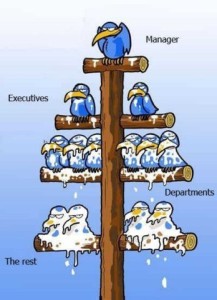Which Side are You On? Moving Beyond Gender Wars
In recent times I’ve noticed a lot of people using ‘feminist’ as a derogatory slur. This is somewhat perplexing because as John Scalzi points out in his blog post ‘To the Dude bro that thinks he’s insulting me by calling me a feminist’, a feminist is someone who thinks that women deserve the same rights and opportunities as men.
Why doesn’t everybody want this? Did I miss something? Are these men and women who use ‘feminist’ as a slur, scholars of philosophy who have realised how the limitations of social constructionism and post-structural thought impact modern day feminism? Or have they been listening to a bit too much Rush Limbaugh and Alan Jones, who are deathly afraid that women are going to ‘Destroy the Joint’ by booting men off the ladder and relegating them to the lowly rank of… well… many women (and non-whites, and non-Christians, and non-hetrosexuals etc)?
I propose that the issue is one of mismatching paradigms. When we talk of patriarchy, it refers to the vertical system of a dominating pecking order that is traditionally led by men. When we refer to feminist ideals, it does not seek to dismantle the pecking order so as to establish a new one with women at the top. Rather, it has a horizontal outlook and takes issue with the whole idea of a pecking order, which happens to be quite problematic for many men too. Namely the men at the bottom of it.
Interestingly enough, these two ways of thinking even end up in the language differences in little boys and little girls. Deborah Tannen undertook numerous linguistic studies and found that generally speaking, little girls in the USA bond through being the same and telling each other their secrets (I have a dog, too!), while little boys bond by bettering each other (I can hit the ball to the moon!). But we also isolate each other through similar means. Women will hurt each other through exclusion, and men through putting each other down. From this stand point, it makes sense that many men, who only really know the pecking order paradigm, are deathly afraid of being kicked off their perch or put down by women. Similarly, many women are afraid, I think, of excluding or feeling separate from the men in their lives. They don’t necessarily realise that feminism has a different agenda: to create a round table.
Aside from the underlying paradigm mismatch, words such as ‘masculine’ and ‘feminine’ seem to further confuse matters. If I am a woman with stereotypical ‘masculine’ traits (decisiveness, rationality, objectivity, etc) should I be insulted? Or should men with stereotypical ‘feminine’ traits (generous, nurturing, cooperative, etc) be insulted? Does ‘feminism’ mean that we can only embrace our feminine selves at the expense of masculinity? Or should we be embracing both our masculine and feminine selves no matter our gender?
Whatever your answers, I propose that feminism needs to adopt a non-gendered frame that enables greater solidarity and understanding of the injustices at hand. Specifically, the frame of subordinated cooperation and coordinated cooperation, as described by Indian mystic and philosopher, P.R. Sarkar. This lens transcends the limitations of gender based language and instead focuses on the nature of the harmful power structures at play, particularly how we treat one another. Furthermore, it offers a new way of understanding other power related issues such as racial equality, workers’ rights (and responsibilities), prejudice and systemic privilege.
Subordinated cooperation is based on a master-slave relationship while coordinated cooperation is when two different entities come together to work with equal rights, prestige and standing. Of course, this is not to say that hierarchy is necessarily bad. We can have a hierarchy that works from a base of coordinated cooperation whereby a supervisor may treat a subordinate with dignity and respect as they work towards common organisational goals and fulfill their potential. It is not the structure as much as the relationships and capacity to fulfill one’s potential that are important here. I may have more skills or a greater intellect than you, but that does not necessarily make me a better human being. And if we get back to the basics of human experience and what you might wish for on your death bed, I would go so far as to say that what matters most is the radius of your love, not where you stand in some socially constructed pecking order or, perhaps, your contribution to economic slavery.
Thus, IMHO the women’s liberation movement (and every other liberation movement for that matter) needs to adopt an articulated goal of coordinated cooperation. This is where despite our differences (remembering that diversity is the law of nature), we are working towards a common goal in a way that not only values the different contributions that we make, but also our capacity to fulfill our potential individually and collectively.
Do we as individuals treat each other with coordinated cooperation? And do our systems treat each other with coordinated cooperation, or do they privilege one group over another? Whatever the answer and however you want to slice our population, a society that confines the development of various groups in relation to others is like a bird with one wing. It can’t take off and reach its potential. So, which side are you on? Coordinated cooperation or subordinated cooperation?


Satya, that is very well constructed opinion and an interesting question. I guess, no matter how much we want it, we will always have these personality types and organisational structures to some degree. Even within equality movements we will have people that will be more aggressive, that put down others or exclude them to promote themselves as more important or as leaders. It is human nature, developed over millennia. Can we evolve beyond this? Of course there is that possibility, but how many generations can we reasonably expect it to take? Can someone even be called a proper part of an equality movement with such personality traits, say a feminist that is exclusionist or uses insults against others simply because they see the world different to the vision they demand right now? And is the movement flawed when such people are idolised? So you are correct in that such movements need to actually practice what they demand of others. When it comes to the basis of management, I totally agree with respect and dignity, but some people need a different form of leadership to others. It is the manager that needs to be adaptable and understand their approach must be tailored to the individual. Some subordinates will be intelligent enough to succeed and develop, to become managers themselves one day. Others will need constant leadership, supervision and motivation. It will seem an unending task and not not all managers will be up to the challenge, nor will all subordinates involve themselves in the process with respect and dignity accorded others. We cannot force them to do so, in either direction and even if they display the right outward attitude are they really engaging in the process fairly. I suppose we are destined to remain a flawed society, one with one wing. That is, as you say, diversity and it will only change by people actually believing in it, one person at a time but I can’t see it happening completely, and certainly not in my lifetime.
Great response Geoff. Yes, we will always see these types of behaviours because there will always be less consciously evolved people. Furthermore, we are often unaware of our own prejudices and privileges. However, that does not relieve us of our responsibility to keep expanding our perspective, reflecting, questioning and finding ways to make things better for everyone so that we can be a bird with two wings. Certainly this happens on a smaller scale. Australians tend to believe in a ‘fair go’, despite society being far from perfect. Why? Because it’s a necessary value and a necessary direction. When you ask most people what they are looking for in life, they will ultimately say happiness, joy, love, peace and these sorts of things. We may not see it in our lifetime, but we owe it to our future great, great grandchildren and beyond to keep at this goal.
If you want to read more on this, I suggest ‘The Liberation of Intellect: Neohumanism’ by P.R. Sarkar.
Regarding leadership styles, yes some people (e.g. children) need to be supervised more closely in certain contexts but the question is, do we take a developmental approach and treat them with love, care and respect (even if that means using disciplinary measures), or do we treat them as slaves to our will?
There is not a definite asewnr to that question. It really just depends on a man or women’s outlook and views in life, and how they show that in their actions. If a women spends her life believing she is dominated and a level lower to men then she probably is; therefore men have it better off in that situation. If you look at it in that the man is the one who is supposed to take care of the family and support then then maybe the women has it better off. If women think of themselves as equals then they truly are. There are pros and cons to being goth either a man or women and there are just as many educated and brilliant women as there are men. There are women that are physically stronger than man and mentally as well. It just depends on your outlook on equality.
Hi Revan,
Whilst it’s true that an individuals ‘agency’ is very much dependent on things like their outlook and confidence etc, it is also true that structural barriers prevent women from truly having equality. It’s not one or the other. Both are required. For example, in many workplaces women are prejudged on their leadership abilities by virtue of being women and not on their actual leadership abilities (there is plenty of academic evidence to demonstrate this – look at the work of Amanda Sinclair). Thus, no matter how ‘equal’ a woman feels, she will still be unable to excel or perhaps be promoted in that environment. One of the best ways to determine how much equality exists in a system is to compare the diversity in the system with the diversity in society. My rough rule of thumb is that anything less than a 40/60% gender split probably has structural barriers that need looking into.